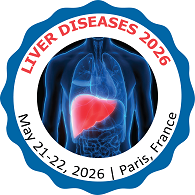Pancreatic cancer
Pancreatic cancer is a type of cancer that originates in the cells of the pancreas, an organ located behind the stomach. It's a relatively aggressive form of cancer that often goes undetected until it has reached an advanced stage, making it difficult to treat effectively. Pancreatic cancer is characterized by its rapid growth and tendency to spread to other parts of the body.
There are two main types of pancreatic cancer:
- Exocrine Pancreatic Cancer
- Endocrine Pancreatic Cancer (Pancreatic Neuroendocrine Tumors, or PNETs)
Related Conference of Pancreatic cancer
April 20-21, 2026
20th World Congress on Gastroenterology -Therapeutics & Hepatology
Barcelona, Spain
Pancreatic cancer Conference Speakers
Recommended Sessions
- Acute pancreatitis
- Cholestasis
- Gallstones
- Hemochromatosis
- Hepatitis
- Hepatocellular Carcinoma
- Hepatology
- Jaundice
- Liver Cancer
- Liver cirrhosis
- Liver diseases
- Liver Fibrosis
- Liver Transplantation
- Non-Alcoholic Fatty Liver Disease (NAFLD)
- Pancreatic cancer
- Pediatric hepatology
- Regenerative Medicine and Liver Regeneration
- Wilson disease
Related Journals
Are you interested in
- Advanced GI Endoscopy Techniques - Gastroenterology Conference 2026 (France)
- Advances in Gastrointestinal Oncology - WORLD GASTROENTEROLOGY 2026 (Spain)
- Advances in GERD Treatment - WORLD GASTROENTEROLOGY 2026 (Spain)
- Alcoholic Liver Disease Studies - Gastroenterology Conference 2026 (France)
- Alcoholic Liver Disease: Emerging Treatments - WORLD GASTROENTEROLOGY 2026 (Spain)
- Artificial Intelligence & Digital Health in GI - Gastroenterology Conference 2026 (France)
- Autoimmune Liver Disorders - Gastroenterology Conference 2026 (France)
- Bariatric Surgery & Obesity-Related GI Disorders - Gastroenterology Conference 2026 (France)
- Barrett’s Esophagus: Current Therapeutics - WORLD GASTROENTEROLOGY 2026 (Spain)
- Celiac Disease: Latest Treatment Options - WORLD GASTROENTEROLOGY 2026 (Spain)
- Cholangiocarcinoma Research - Gastroenterology Conference 2026 (France)
- Clinical Trials & Translational Research - Gastroenterology Conference 2026 (France)
- Digestive Health’s, Therapeutics & Diagnostics - Gastrosummit 2026 (UK)
- Emerging Therapies for Crohn's - WORLD GASTROENTEROLOGY 2026 (Spain)
- Endoscopic Ultrasound (EUS) & Advanced Imaging - Gastroenterology Conference 2026 (France)
- Endoscopists - Gastrosummit 2026 (UK)
- Endoscopy - Gastrosummit 2026 (UK)
- Esophageal Disorders: Current Treatments - WORLD GASTROENTEROLOGY 2026 (Spain)
- Gastroenterologists - Gastrosummit 2026 (UK)
- Gastroenterology - Gastrosummit 2026 (UK)
- Gastrointestinal - Gastrosummit 2026 (UK)
- Gastrointestinal Disorders: Clinical Updates - Gastroenterology Conference 2026 (France)
- Gastrointestinal Oncology - Gastroenterology Conference 2026 (France)
- Gastrointestinal Polyposis Syndromes - Gastroenterology Conference 2026 (France)
- Gastrointestinal Stromal Tumors: Novel Therapies - WORLD GASTROENTEROLOGY 2026 (Spain)
- Geriatric Gastroenterology & Liver Disorders - Gastroenterology Conference 2026 (France)
- GI Bleeding & Hemostasis Innovations - Gastroenterology Conference 2026 (France)
- GI Surgeons - Gastrosummit 2026 (UK)
- Global Health & Public Health Challenges in GI & Liver - Gastroenterology Conference 2026 (France)
- Gut Microbiome & Therapeutics - Gastroenterology Conference 2026 (France)
- Hepatic Encephalopathy: Modern Management Strategies - WORLD GASTROENTEROLOGY 2026 (Spain)
- Hepatitis C Therapeutics - WORLD GASTROENTEROLOGY 2026 (Spain)
- Hepatocellular Carcinoma & Liver Tumor Management - Gastroenterology Conference 2026 (France)
- Hepatocellular Carcinoma: Latest Approaches - WORLD GASTROENTEROLOGY 2026 (Spain)
- Hepatologists - Gastrosummit 2026 (UK)
- Inflammatory Bowel Disease (IBD) - Gastrosummit 2026 (UK)
- Inflammatory Bowel Disease Research - Gastroenterology Conference 2026 (France)
- Innovations in IBD Management - WORLD GASTROENTEROLOGY 2026 (Spain)
- Liver Cirrhosis: New Therapies - WORLD GASTROENTEROLOGY 2026 (Spain)
- Liver Disease: Chronic and Acute Management - Gastroenterology Conference 2026 (France)
- Liver Disorders - Gastrosummit 2026 (UK)
- Liver Transplantation Innovations - Gastroenterology Conference 2026 (France)
- Microbiome - Gastrosummit 2026 (UK)
- Microbiome and Gastrointestinal Health - WORLD GASTROENTEROLOGY 2026 (Spain)
- Minimally Invasive Gastrointestinal Surgery - Gastroenterology Conference 2026 (France)
- NAFLD and NASH Treatments - WORLD GASTROENTEROLOGY 2026 (Spain)
- New Approaches to Peptic Ulcer Disease - WORLD GASTROENTEROLOGY 2026 (Spain)
- Non-Alcoholic Fatty Liver Disease (NAFLD) & NASH - Gastroenterology Conference 2026 (France)
- Nutrition, Diet, and Lifestyle in GI & Liver Health - Gastroenterology Conference 2026 (France)
- Oncologists - Gastrosummit 2026 (UK)
- Oncologists - Gastrosummit 2026 (UK)
- Palliative Care & Quality of Life in GI & Liver Disorders - Gastroenterology Conference 2026 (France)
- Pancreatitis: Modern Therapeutic Strategies - WORLD GASTROENTEROLOGY 2026 (Spain)
- Pediatric and Adult Liver Metabolic Disorders - Gastroenterology Conference 2026 (France)
- Pediatric Gastroenterology & Hepatology - Gastroenterology Conference 2026 (France)
- Pharmacology & Novel Therapeutics - Gastroenterology Conference 2026 (France)
- Precision Medicine - Gastrosummit 2026 (UK)
- Precision Medicine & Biomarkers in Gastroenterology & Hepatology - Gastroenterology Conference 2026 (France)
- Public Health - Gastrosummit 2026 (UK)
- Rare GI & Liver Disorders - Gastroenterology Conference 2026 (France)
- Regenerative Medicine in Liver & GI Disorders - Gastroenterology Conference 2026 (France)
- Therapeutics for Biliary Diseases - WORLD GASTROENTEROLOGY 2026 (Spain)
- Ulcerative Colitis: Innovative Treatments - WORLD GASTROENTEROLOGY 2026 (Spain)
- Viral Hepatitis Research - Gastroenterology Conference 2026 (France)
- Viral Hepatitis: New Treatment Paradigms - WORLD GASTROENTEROLOGY 2026 (Spain)

